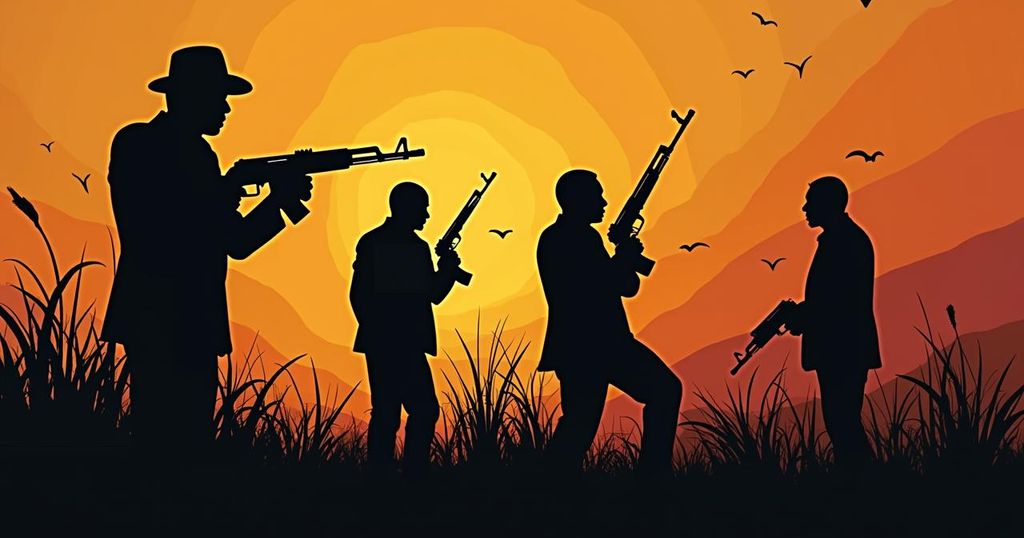Mozambique Votes: New Political Faces Promise to Tackle Armed Conflict
Mozambique is set to hold elections that may introduce a youthful president born after independence for the first time. President Filipe Nyusi will step down following his eight-year term amidst corruption scandals. Voters will select among candidates like Daniel Chapo, Ossufo Momade, Venancio Mondlane, and Lutero Simango, all addressing urgent issues such as armed conflict, unemployment, and climate resilience. Election results are expected within 15 days, with significant implications for the nation’s direction.
Mozambique is poised to undertake crucial elections that hold the potential to elect a president born post-independence for the first time. Approximately 17 million citizens from a population of 32 million are eligible to participate in this significant electoral event, which will include simultaneous legislative and local elections across all 11 provinces. These elections come at a time of considerable unrest, marked by ongoing armed conflict and severe humanitarian challenges arising from droughts and food shortages. President Filipe Nyusi of the Mozambique Liberation Front (Frelimo) will be concluding his tenure amidst a backdrop of corruption scandals that have plagued his administration, namely the notorious “tuna bond” scandal that resulted in substantial financial losses and criminal convictions of senior officials. The candidates vying for the presidency present a blend of new and experienced political figures: 1. Daniel Chapo (47) – Emerging as a potential successor of Frelimo’s political legacy, Chapo’s rapid rise includes significant roles within the party, but skepticism surrounds his ability to distance himself from Frelimo’s corrupt reputation. 2. Ossufo Momade (63) – The Renamo leader, a veteran of the Mozambican civil war, enjoys a degree of support due to his historical importance in peace processes but faces challenges based on his affiliation with the old political order. 3. Venancio Mondlane (50) – An independent candidate, Mondlane resonates with the younger demographic and emphasizes the need for job creation and economic change. 4. Lutero Simango (64) – Leading the Democratic Movement of Mozambique, Simango advocates for industrial development and better job opportunities. The electoral discourse predominantly focuses on three pressing issues: the ongoing armed conflict in Cabo Delgado, high unemployment rates exacerbated by the COVID-19 pandemic, and the need for climate resilience amidst environmental crises. Voting results will be tabulated immediately following the close of polls and official results are anticipated to emerge within a 15-day period, allowing a window for potential disputes to be filed by contesting parties. As Mozambique navigates this electoral process, the stakes are profound, as the new leadership will be crucial in addressing the challenges of poverty, insecurity, and corruption that have long beleaguered the nation.
Since gaining independence from Portuguese rule in 1975, Mozambique has grappled with political instability, corruption, and conflict. The current elections are particularly significant as they represent a potential generational shift in leadership, a response to the pervasive disillusionment among the youth regarding governance, and a yearning for change. The impending elections are taking place against a backdrop of turmoil, with an ongoing insurgency in Cabo Delgado province and a humanitarian crisis caused by climate change and socioeconomic instability. This context is critical as it frames citizens’ voting priorities and the candidates’ campaigns, which largely revolve around restoring peace, promoting economic growth, and improving governmental transparency and accountability.
The elections in Mozambique signify a pivotal moment in the country’s political landscape, with the potential for transformative leadership emerging from the youth’s desire for change. As President Nyusi steps down, the next leader will be tasked with addressing the pressing issues of armed conflict, poverty, economic development, and corruption. The diverse array of candidates presents voters with distinct choices, highlighting the importance of this democratic process. Ultimately, the outcomes of these elections will not only define Mozambique’s political trajectory but also determine the future stability and prosperity of its people.
Original Source: www.aljazeera.com




Post Comment